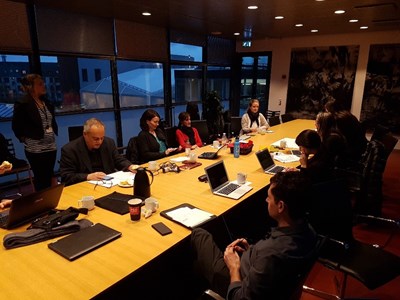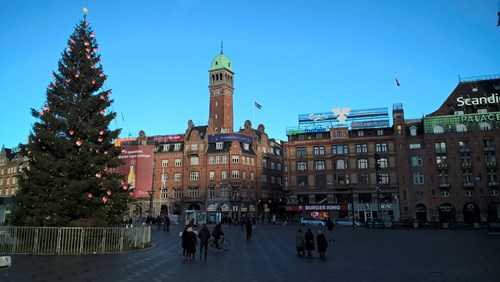Comparing the situation in the Global South and the Global North was only one of the aims of the international workshop that took place at the Copenhagen Business School (CBS) the first week of December 2018. Titled “towards a research agenda for socially responsible green transitions: Meaningful stakeholder engagement, public participation and impact assessment of natural resource exploration and exploitation - comparing Arctic and Global South experiences and identifying synergies for future research”, the seminar had the ambition to bring together scholars and practitioners from all over the world. Particularly, its main purpose was to create connections between scholars working in the academic environment, who have inevitably a more theoretical background, and those professionals working on the field, who have plenty of practical experience.
The first day of the workshop was focused on the Arctic, with presentations that analysed different Arctic related issues in several Arctic countries. Remarkably, the issue of meaningful engagement was one of the core matters: from stakeholders engagement to communities engagement, it is clear that there is a need to implement international standards in a certain way in order to ensure a meaningful engagement of all parties at stake (stakeholders or right holders). However, it must be taken into account that there is no specific standard as regards meaningful participation of local communities. In this sense, various case studies from Canada, Ghana, Russia, Norway and Greenland were taken into account.
During the afternoon session, the attention was focused on the need to take into account local knowledge when dealing with Arctic-related issues and especially in those cases of exploration/exploitation of natural resources. Particularly, when carrying out Impact Assessment (Social, Environmental, etc.), indigenous knowledge and concerns need to be taken into consideration. Thus, those tools that can ensure a meaningful public participation (especially youth engagement) should be enhanced. Notably, it must be underlined that engaging indigenous people in decision-making is not the same of using their knowledge when implementing a project.

The following day of the seminar was dedicated to the analysis of the situation in the Global South. Starting with the analysis of the palm oil industry and its effects on local and indigenous people in specific areas in the Global South, the speakers presented other relevant cases connected to the agro-industry. Examples of intensive farming and mining programmes and their impact on communities’ coherence in Latin America (particularly from Chile) were taken into account. Similar cases from Brazil were presented, with a specific analysis of the meaning of CSR, SLO and stakeholder involvement during the implementation of an exploitation process.
The third day of the seminar was devoted to the analysis of specific tools that could ensure a better stakeholder engagement. The concepts of supply chain transparency and global value chain were analysed, especially in relation to impact assessment, social impacts and public involvement. In addition, business-related issues were addressed, such as the concept of risk and due diligence. Finally, the need to promote a meaningful stakeholder engagement was analysed as a concept to prevent business-related damages to society. In this sense, the necessity of having sustainable business and the need to have transnational business governance were addressed.

Rådhusplads, Copenhagen, on a rare sunny day – 9 December 2018
The final day of the workshop was dedicated to brainstorming, in order to explore future possible collaboration in terms of research funding and publishing opportunities. Having people from many different countries and with diverse background was fruitful because it allowed us to put original ideas together. Dealing with issues related to resources exploitation and comparing how stakeholders are meaningfully involved in decision-making in different parts of the world, offered us the possibility to tackle problems with a different perception. In point of fact, the workshop was extremely useful to deconstruct the dichotomy North/South of the World. Particularly, several presentations demonstrated that bad/good practices can be implemented in the Global South and in the Global North, depending on the socio-economic and political situation and, above all, depending on the actors involved in the implementation of such specific tools. In this sense, it must be underlined the fact that promoting a meaningful stakeholder engagement cannot be western-driven, but should be developed according to the needs and development desires of local communities.
To conclude, I would like to thanks the north2north programme for the finance support and prof. Karin Buhmann, from CBS, for organising such a wonderful seminar and for the passion that she put into it. I really enjoyed the workshop and I think it gave me a priceless opportunity to expand my horizons as regards the similarities between the Global South and the Global North as regards resources exploitation. From now on, I will take into account such similarities when working to my research; keeping in mind that every situation is different, though it might have analogies with another one in a different part of the world.
